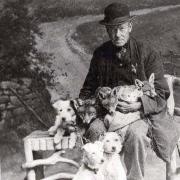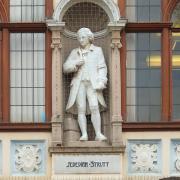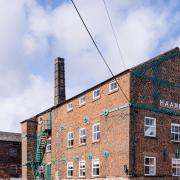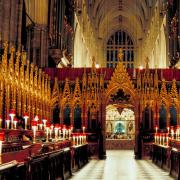The Archbishop of Canterbury supports the University of Derby’s campaign to end modern slavery

Mention the word ‘slavery’ to most people and they’re likely to think of the barbaric conditions of the slave ships that transported men, women and children from the African continent to the colonies to work 18-hour days, every day of the week, on tobacco, sugar and cotton plantations – where average working life expectancy was between just seven and nine years.
Whilst working conditions were appalling, getting to the destination was the first ordeal. Of the 10 million slaves transported between the years 1500 and 1800, 15% – or one and a half million – died in transit. Despite the loss of life the slave trade was highly lucrative; once the live cargo had disembarked and had been sold, the ships were loaded with tobacco, sugar, textiles and other merchandise destined for markets in the UK and Europe. The ships, once relieved of their valuable merchandise from the colonies, returned to West Africa to repeat the process.
From the early 1700s there were calls for the slave trade to be abolished and campaigners, including Methodist minister John Wesley, publicly demanded an end of what was seen by many as an immoral trade. By the late 1700s the tide was turning against slavery and the anti-slavery lobby gained ground. Parliamentarian William Wilberforce – who became the voice of the abolitionist movement – campaigned tirelessly to end the slave trade and his lobbying paved the way for the Abolition of the Slave Trade Act, which was passed in 1807. Whilst the act banned the trade in slaves, it wasn’t until 1833 when the Abolition of Slavery bill was finally passed by Parliament, that freedom was granted to all slaves throughout the British Empire.
It is over 200 years since the trade in slaves was abolished and easy to assume that slavery has been consigned to the history books, but slavery continues to this day and is much closer to our everyday lives than we might imagine or like to acknowledge. In almost every town and city across the country there will be nail bars, hand car washes and food producers that use trafficked and bonded labour. The modern day slaves are paid a pittance and forced to live in squalid, overcrowded conditions. Their passports are often confiscated and they are under lock and key when not working.

In 2016 the slave trade has become the second most prolific criminal activity in the world. Whereas businesses in the 18th and 19th centuries lobbied parliament to maintain the slave trade – because it was so profitable – today the corporate world is playing an increasingly important role in helping to bring an end to modern slavery and human trafficking. However, with businesses operating in an increasingly global economy it hasn’t been easy (and there has been no legal imperative) for UK-based companies to ensure that their supply chains are free from bonded or otherwise exploited labour.
In 2015 parliament passed the Modern Slavery Act, which is only the second piece of legislation in 200 years that makes slavery illegal. As a result of the new law, companies with an annual turnover of more than £36m are legally obliged to ensure that their supply chains – in the UK and overseas – do not employ people who have been trafficked or are working against their will.
In William Wilberforce the country had a committed social reformer and campaigner who ultimately brought about the end of slavery. Today, the Bishop of Derby, Alastair Redfern, is a passionate campaigner who is working hard to end modern slavery and all forms of labour exploitation. He played a pivotal role in the drafting of the Modern Slavery Act and in 2014 was instrumental in establishing the Derby Modern Slavery Partnership.
On 23rd June the Archbishop of Canterbury and the Bishop of Derby were guests of honour at ‘Action 2030: Ending Modern Slavery Together’ which was jointly organised by Bishop Alastair’s office and the University of Derby’s International Policing and Justice Institute.

The high profile event was part of the Archbishop of Canterbury’s three-day visit to the Diocese of Derby, organised by the Bishop of Derby’s office. The aim of ‘Action 2030’ – attended by over 50 directors and senior personnel – was to encourage companies across the East Midlands to pledge support for the Athens Ethical Principles adopted by the United Nations Global Compact in Athens in 2006.
2030 is the United Nations’ deadline for the eradication of all forms of human trafficking; it is one of their sustainable development goals and reinforces human trafficking’s status as the second most prolific crime in the world.
Commenting on the event Bishop Alastair said: ‘We were delighted to have welcomed the Archbishop to our Diocese and to share with him some of the vital work carried out in the community, and also the challenges and opportunities we face.
‘I was delighted that the Archbishop was able to join me to urge business leaders to combat modern day slavery and exploitation in the supply chain. His presence shone a spotlight onto one of the most important social issues of our time. Working with businesses will be an important focus for my work over the next year.’
‘Action 2030’ was jointly organised by the International Policing & Justice Institute, which offers world-class police education solutions, research and innovation. Based within the University of Derby’s College of Law, Humanities and Social Sciences, it has the largest concentration of expertise in criminal investigation within a university in Europe. It is the only institution in the world to have been commissioned to accredit the qualifications of overseas police forces, including the Royal Malaysia Police.
Professor Bampton, director of the Institute said: ‘It was an honour and a privilege to welcome the Archbishop of Canterbury to the Institute. We were all delighted that he supported the aims of our campaign that will help improve the lives of tens of thousands of people around the globe who are being trafficked.
‘Many companies in the developed world unwittingly support human trafficking, especially when they employ staff based overseas — many of whom are trafficked or otherwise exploited. This is why it is so important for companies in our region and beyond to sign-up to bring an end to human trafficking by 2030.’
Professor Kathryn Mitchell, Vice-Chancellor of the University of Derby formally opened the event and welcomed the Archbishop of Canterbury and the Bishop of Derby to the institute. There were presentations from David Arkless (Global Business Coalition Against Trafficking), Professor Bampton and the Bishop of Derby. The Archbishop of Canterbury responded to the speakers and endorsed the work of the Bishop of Derby, the University of Derby and other organisations striving to bring an end to modern slavery.
Following the keynote speakers there was a short ceremony during which those who had agreed to commit their organisation to the Athens Ethical Principles signed the declaration in the presence of the Archbishop of Canterbury and Bishop of Derby – who were both counter-signatories.
The Athens Ethical Principles are not legally binding, but they do provide moral guidance and leadership for those companies and organisations who are committed to eradicating all forms of labour exploitation from their supply chains. The University of Derby was one of the ten organisations to sign the declaration as Professor Mitchell explains: ‘We were honoured to welcome the Archbishop of Canterbury to the University of Derby to take part in the Action 2030 conference. The Archbishop revealed how modern slavery and human trafficking are significant problems in our world today, and he called on businesses to do more to tackle modern slavery in their supply chains.
‘Modern slavery and human trafficking undermine the humanity of victims and there should be no place for these appalling practices in the 21st century. That’s why the University of Derby joined the Archbishop of Canterbury to pledge our support to the Athens Ethical Principles, which demonstrates our commitment to ending modern slavery.’
For more information about the International Policing and Justice Institute: www.derby.ac.uk/theinstitute
The companies and organisations that signed on the day included: Bowmer & Kirkland; Fifty Eight; JCB; Jobs, Education & Training; Mercia Image Print; Office of the Police & Crime Commissioner; Pennine Healthcare; Staffline; The Cardinal Group; University of Derby.
ABOLITIONIST FROM DERBY
Derby-born Reverend Thomas Gisborne (1758-1846), who became a leading light in the abolitionist movement, was educated at Harrow and St John’s College, Cambridge. After university he was offered a position as an MP, which he turned down in favour of taking Holy Orders. He became curate of Barton-under-Needwood in 1783. As well as a prolific poet and writer, Gisborne was a vocal opponent of the slave trade; he was also an active member of the Clapham Sect (a group of evangelical Christians prominent in England from around 1790 to 1830). The Sect campaigned for the abolition of slavery and also promoted missionary work at home and abroad. One of the Sect’s founding members was William Wilberforce, whom Gisborne had met during their time at Cambridge. As the Sect expanded Gisborne used Yoxall Lodge – his family home on the border of Derbyshire and Staffordshire – for regular meetings. Gisborne lived to see both the 1807 Act of Parliament implemented, which brought an end to the slave trade, and in 1833 a second Act which gave all slaves across the Empire their freedom.
BAPTISMS
In addition to the conference on tackling modern slavery, the Archbishop of Canterbury’s three-day visit in June included hosting a public open forum at The Roundhouse, Derby College, and a tour of the county where he visited local businesses, head teachers and a range of social projects, including work in Chesterfield and Glossop. In Glossop he joined local vicar Andrew Hargreaves and young people from across the Diocese at the ‘Jesus on the Square’ event which culminated with a number of full immersion baptisms.



























